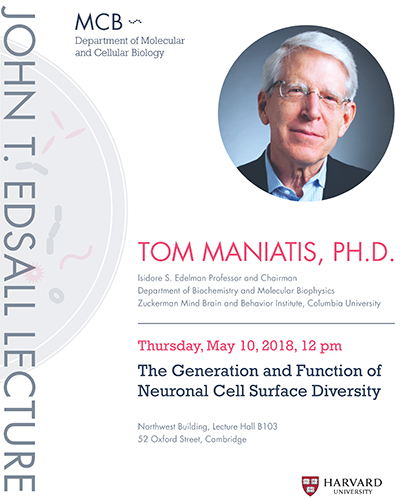Tom Maniatis is the Isidore S. Edelman Professor and Chair of the Department of Biochemistry and Molecular biophysics at the Columbia University Medical Center. He was recently named Scientific Director and Chief Executive Officer of the New York Genome Center. Dr. Maniatis is known for pioneering the development of gene cloning technology and its application to both basic research and biotechnology. He also coauthored the definitive laboratory manual on Molecular Cloning. His research has led to fundamental advances in understanding the mechanisms of gene regulation and RNA splicing, the biochemistry of innate immunity signaling pathways, the function of single cell diversity in the nervous system, and neurodegenerative disease mechanisms. Dr. Maniatis’ research has been recognized by many awards, including the Eli Lilly Award in Microbiology and Immunology, The Richard Lounsbery Award for Biology and Medicine (Awarded by the French and U.S National Academy of Sciences), and the 2012 Lasker-Koshland Special Achievement Award in Medical Science. He is a member of the U.S. National Academy of Science, the U.S. Academy of Medicine, and a fellow of the U.S. Academy of Arts and Sciences. Dr. Maniatis received his B.A. and MS. degrees from the University of Colorado in chemistry and biology, and his Ph.D. in molecular biology from Vanderbilt University. As a postdoc with Mark Ptashne at Harvard, he did foundational work on the cooperative binding of lambda repressor to the clustered operator sites and sequencing the operators. Then in running his own lab as an Assistant Professor at Harvard, he pioneered cloning methodology but was driven out of Cambridge to Caltech due to a ban on recombinant DNA. When it was safe, he returned to Harvard University and among other things discovered the lariat in splicing. His laboratory is currently focused on molecular neuroscience, with interests in the role single cell diversity in brain wiring, and disease mechanisms in the neurodegenerative disease ALS.

by Polina Kehayova
About the John T. Edsall Lecture
The Edsall Lecture is given annually in honor of John Edsall, a member of the faculty of Harvard University from 1928 to 1973, when he became emeritus but remained engaged in research for more than 20 years. He died in 2002 a few months short of 100 years of age. Dr. Edsall’s scientific career started in Edwin J. Cohn’s Department of Physical Chemistry at Harvard Medical School, where he studied the properties of the muscle proteins and of the amino acids. These studies among many others led to the 1943 book by Cohn and Edsall, Proteins, Amino Acids and Peptides as Ions and Dipolar Ions, which became a classic in the field of protein chemistry. During World War II he had a key role in isolating blood proteins for the war effort and developed fibrin foam, a porous form of a fibrin clot for use in neurosurgical procedures. In 1954, Dr. Edsall joined the Faculty of Arts and Sciences and moved to the Biological Laboratories, where he started research on carbonic anhydrase. He was greatly concerned with education. He was a tutor in the biochemical sciences concentration for 40 years and Head Tutor from more than 25 years. He taught a course on biophysical chemistry at the college from 1940 until he retired; the course led to the writing of a textbook with his closest scientific colleague, Jeffries Wyman. He had a leading role in 1954 in the formation of the Committee on Higher Degrees in Biochemistry, a graduate program leading to the PhD degree in biochemistry; the committee became the Department of Biochemistry and Molecular Biology in 1967. Dr. Edsall was also a champion in the fight for the freedom and integrity of science.
by Guido Guidotti




